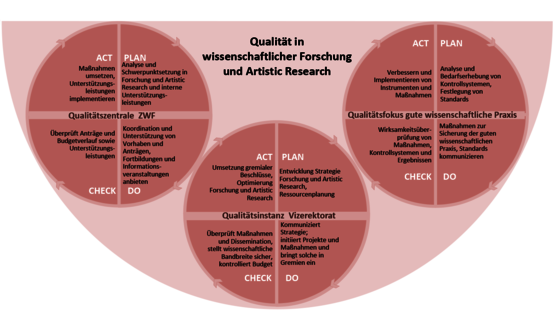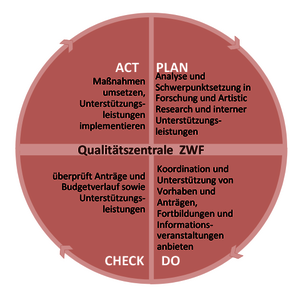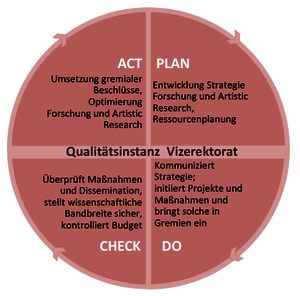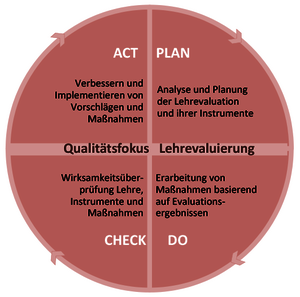- About the university
- Einfache Sprache
- Rector’s office
- Administration
- General Contact Information
- Student Affairs Office
- Library and Media Centre
- Faculty Management & Secretary's Offices
- Orchestra Management
- Event Management
- External Relations, Development and Quality Assurance
- Marketing and Communication
- Human Resources Management
- Accounting/Controlling
- IT Management
- Infrastructure/Facility Management
- Porters
- Quality management
- Sites
- Opening hours
- Vollpension at the MUK
- Cooperations
- MUK.youngstars
- Vacancies
- Press
- International relations
Quality in Academic Research and Artistic Research
Quality Central Centre for Science and Research (ZWF)
Quality Authority Vice Rectorate
Quality Focus Good Scientific or Artistic-Scientific Practice
In addition to scientific research, three areas are subsumed under the internationally established term Artistic Research at the MUK:
Development and appreciation of the arts, artistic research and cooperation between science and art. Their distinction is not linked to a qualitative evaluation, but is based on differences in theoretical embedding, methodology, documentation or knowledge transfer. A working group for the definition and categorization of artistic research at the MUK has developed standardized definitions for this purpose.
The quality of scientific research and artistic research is ensured on three levels in the MUK quality management system.
The Quality Central Centre for Science and Research (ZWF) is the central interface for quality assurance in scientific research and artistic research.
The Quality Authority Vice Rectorate refers to the operative responsibility of the Vice Rector for Science and Research as head of the ZWF in quality assurance in scientific research and artistic research.
The Quality Focus Good Scientific or Artistic-Scientific Practice comprises the quality assurance instruments and measures for good scientific practice.
These levels serve the regular and systematic collection of information in research and artistic research and enable the implementation of quality assurance measures in these areas.

The system enables the implementation of the strategy and goals for research and artistic research formulated in the MUK mission statement and development plan. The processes employed bring about a continuous advancement and development in research and artistic research and check their effectiveness.
Quality Central Centre for Science and Research (ZWF)
The tasks and competencies of the Centre for Science and Research (ZWF), as the central interface of quality assurance in scientific research and artistic research, are regulated in the statutes of the MUK. The development projects of the ZWF are mainly laid down in the development plan.
As an interdisciplinary and cross-faculty platform, the ZWF ensures the development of strategies and binding standards for the field of science and research at MUK. According to the statutes of MUK, the ZWF is oriented towards the strategic research priorities of the Music and Arts University of the City of Vienna.
The statutory tasks of the Centre for Science and Research are as follows:
Development, bundling and implementation of research projects
Dissemination of the research results in cooperation with the study programmes
Ensuring cooperation through regular exchange of all course directors, the head coordinator of inter-faculty courses of study and representatives of the scientific research disciplines
Ensuring the development of strategies as an interdisciplinary and cross-faculty platform
Ensuring binding standards for the field of science and research
The fulfilment of these tasks follows the quality assurance PDCA cycle.
PLAN Analysis and setting of priorities in research and artistic research and internal support services
DO Coordination and support of projects and applications, training and provide information events
CHECK The research service as part of the ZWF reviews applications and budget progress and
support services
ACT Implement measures, implement support services
Quality Authority Vice Rectorate
Quality Authority Vice Rectorate designates the operative responsibility as Vice Rector for Science and Research and as head of the ZWF. It is responsible for quality assurance and coordination of research and artistic research at the University of Music and Performing Arts Private University of the City of Vienna.
According to the statutes, the Vice Rector is appointed by the Rector after approval by the Senate and the University Council. The qualitative assurance of the regular review of the work of the function of the vice-rector is guaranteed in the statutes in so far as his or her period of office is linked to that of the rector and is thus cyclically subject to an evaluation (four years).
With the coming into force of the new statutes, the Centre for Science and Research (ZWF) has been anchored at the interface to the rectorate since 2020 under the leadership of a vice rector for research. The vice rector is also a member of the joint commission of the two study and research commissions in order to ensure that scientific and artistic-scientific agendas are pursued across faculties. As an interdisciplinary and cross-faculty center, it ensures the development of strategies and binding standards for the field of science, research and artistic research at MUK.
The expansion of research and artistic research at the MUK is one of the development goals of the rectorate, as set out in the development plan. The development of artistic research was defined as the core mission in the mission statement. Strategy development, implementation and achievement of these goals are largely the responsibility of the vice rector.
The vice rector is responsible for the following tasks at MUK:
Securing resources in research and artistic research (budget planning, personnel, rooms, infrastructure, control structures).
Strategy development of research and artistic research (priorities, cooperations, objectives, events).
Quality assurance of research projects: Under the direction of the vice rector, the planned third-party funded projects are reviewed by the research service for quality assurance according to international excellence criteria.
Ensuring continuous improvement (review of disseminations and research-guided teaching, guided communication).
Implementation of decisions and guidelines in research and artistic research.
The fulfilment of these tasks follows the quality assurance PDCA cycle.
PLAN Development Strategy Research and Artistic Research, resource planning
DO Communicates strategy; initiates projects and measures and brings them to committees.
CHECK Checks measures and dissemination, ensures scientific bandwidth, controls budget.
ACT Implementation of committee decisions, optimization of research and artistic research
Quality Focus Good Scientific or Artistic-Scientific Practice
The MUK has structures and procedures in place to ensure that the rules of good scientific or artistic-scientific practice are observed. The Science, Research and Artistic Research department makes use of both internal university quality assurance instruments as well as instruments involving external quality assurance control systems.
Instruments to ensure good scientific or artistic-scientific practice
Internal university quality assurance instruments in this area are workshops, training courses, scientific colloquia and in-depth courses on topics such as plagiarism vs. good scientific practice.
In addition, the MUK research service continuously contributes to ensuring good scientific and artistic-scientific practice.
A structural multi-eye principle ensures internal quality assurance by anchoring the Centre for Science and Research (ZWF) as well as by establishing research services in the Rectorate. Research agendas are discussed in the regular meetings of the Centre for Science and Research and are also discussed with the involvement of the deans in the meetings of the Rectorate.
Plagiarism constitutes a violation of the criteria of good scientific or artistic-scientific practice. For this reason, the Rectorate of the MUK has drawn up a guideline and an independent investigation procedure on this topic to ensure quality in academic practice, based on the relevant study regulations. The guarantee of compliance with these criteria is ensured in several ways with regard to Bachelor's or Master's theses at the MUK. For these Bachelor's and Master's theses, the respective head of the course Scientific Colloquium is primarily responsible for ensuring compliance with scientific standards and scientific integrity. In addition to the supervision and close cooperation with students and subject supervisors, the plagiarism detection software PlagScan Pro has been used at the MUK since the new study regulations 2017 came into effect. The Centre for Science and Research trains the course leaders of the scientific colloquia in the use of this software. The joint commission of the two StuFoKos has designed a routing slip (which summarizes all necessary steps to obtain the degree) to point out the use of this software to the students. A course on prevention takes place regularly and the library supports students in the introduction to scientific working techniques.
The results of the software checks are verified by the head of the Scientific Colloquium. If the suspicion of plagiarism is confirmed, the consequences under study law are applied. For this purpose, there is a rectorate resolution from 2017 which regulates the plagiarism procedure at the MUK. As a registered user of a beta version, MUK has been contributing to the further development of an analysis tool (Author Metrics) since May 2019, with which translation plagiarism and the work of ghost writers can be more easily detected.
By promoting excellent theses, the MUK also provides positive incentives. Since 2011, the MUK, in cooperation with the Cultural Department of the City of Vienna, has been awarding prizes/scholarships for outstanding academic Bachelor's and Master's theses. The awarding of the four sought-after prizes/scholarships leads to a significant enhancement of the young researchers' research achievements at the MUK.
Students are also increasingly involved in projects and activities of the Centre for Science and Research as well as in the organization of artistic and scientific events through contracts for work or freelance contracts as student assistants. In this way, students are already familiarized with scientific activities such as the editing of publications during their studies, thus broadening their expertise. In addition, working at the ZWF is intended to awaken students' interest in scientific work and to show them a possible career path in this field.
In order to ensure the quality of academic theses at the MUK and to give students the opportunity to learn from students, a writing workshop for students in the form of weekly office hours in the library has been set up from the summer semester 2020 onwards. The main focus of this workshop is to provide advice on the preparation of Bachelor's and, if applicable, Master's theses, whereby support is primarily offered in formal aspects.
Instruments to ensure good scientific or artistic-scientific practice, including external quality assurance control systems
The co-financing of publications and conferences according to the Matching Fund Principle guarantees the excellent quality of internally financed projects by basing their financing on the excellence criteria of external reviewers.
In order to ensure the quality of internal processes externally, the ZWF Advisory Board has also been available for internal review processes since the winter semester 2019/20.
Review by external project partners and experts in research and artistic research at MUK, e.g. in topic-related working groups.
Inter-university cooperation: In addition to its excellent reputation in artistic education, the MUK also has unique selling points in the field of artistic research, such as in the areas of operetta, dance, musicals or, in the future, performance art, which make it interesting for other universities as a cooperation partner. Against this background, the MUK is increasingly focusing on inter-university cooperation both nationally and internationally.
Examples of inter-university cooperation in the area of scientific or artistic-scientific research:
Inter-University Research Association Elfriede Jelinek (University of Vienna and MUK)
Research network Beyond the nation, beyond the subject. Rethinking Austrian Modernism (University of Kent UK, Co-Applicant the MUK)
Review by research funding agencies: The scientific community ensures quality assurance by requiring that publications, conference and travel grants, scholarships and, last but not least, externally funded projects undergo a strict review system based on excellence criteria — usually in the form of peer review procedures.
The fulfilment of these tasks follows the quality assurance PDCA cycle.
PLAN Analysis and needs assessment of control systems, definition of standards.
DO Measures to ensure good scientific practice, communicate standards.
CHECK Effectiveness review of measures, control systems and results.
ACT Improve and implement instruments and measures.





